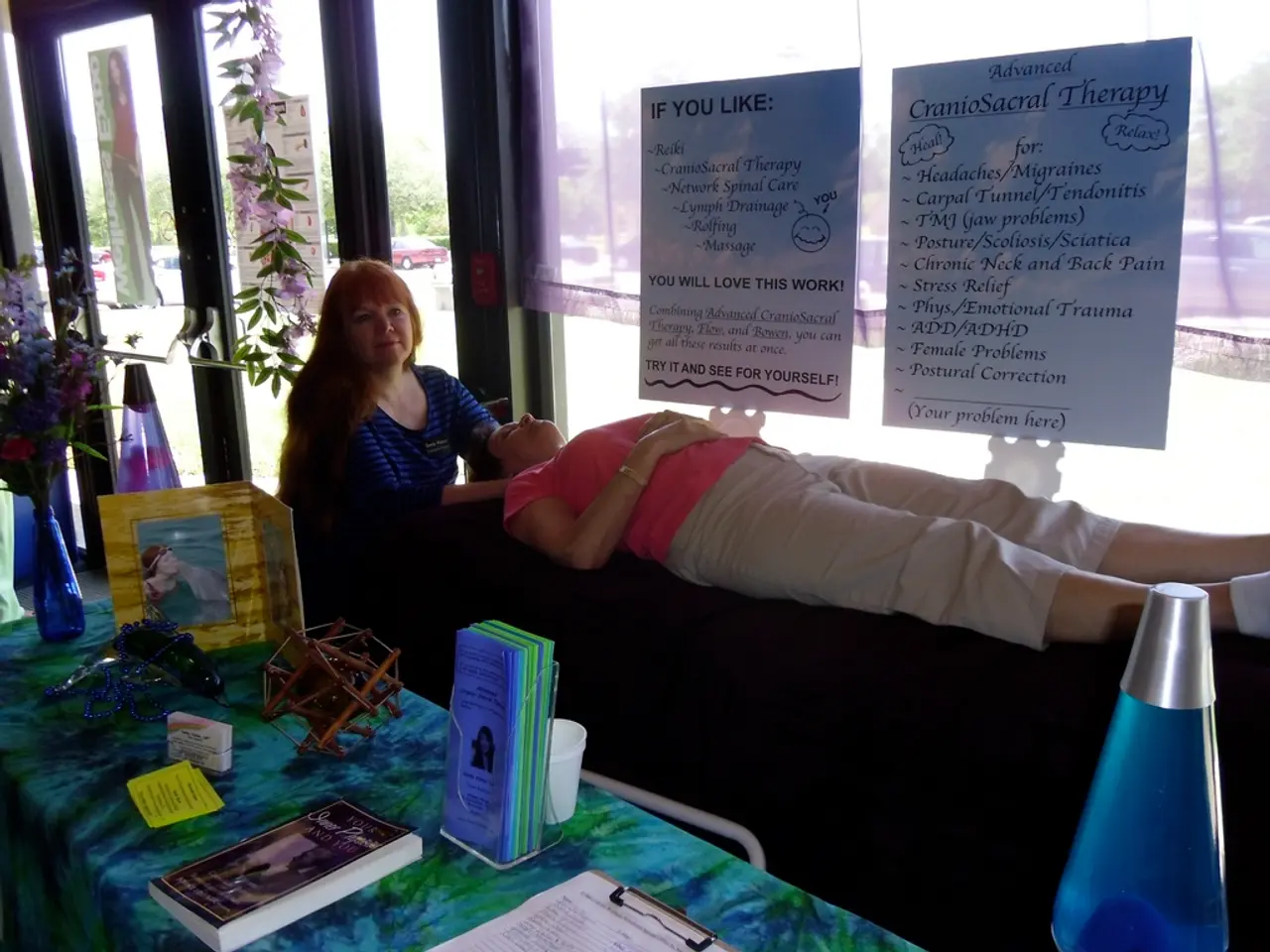MDMA-assisted psychotherapy: Applications, methodology, and ongoing studies
MDMA-assisted therapy (MDMA-AT) is an emerging treatment that is showing great promise in the field of mental health, particularly for Post-Traumatic Stress Disorder (PTSD). This innovative therapy, which combines regulated doses of MDMA with psychotherapy sessions, is currently in the final stages of clinical trials in the United States and other countries.
The Food and Drug Administration (FDA) has classified MDMA as a Breakthrough Therapy, supporting further research and development of MDMA therapy. This designation is given to treatments that have the potential to significantly improve patient outcomes compared to existing treatments.
In a study involving 90 participants with severe PTSD, three doses of MDMA alongside therapy sessions over 18 weeks resulted in a significant reduction in PTSD and depressive symptoms. After 18 weeks, 67% of participants in the MDMA group and 32% in the placebo group no longer met the criteria for PTSD diagnosis. After three therapy sessions, 33% of participants in the MDMA group and 5% in the placebo group met the criteria for remission of PTSD.
The therapy has been found to be safe and well-tolerated, with generally mild, transient adverse events. Treatment with MDMA did not increase the risk of suicidal thoughts or potential for drug misuse.
Research into MDMA therapy for treating PTSD is currently in the third and final stage of clinical trials. Institutions like UCSD are conducting active trials investigating MDMA-assisted therapies integrated with specific psychotherapeutic approaches for chronic PTSD and relationship functioning improvement. These trials include different dosing schedules and variations such as cognitive behavioral conjoint therapy.
In addition to PTSD, current research is also investigating the uses of MDMA therapy in the treatment of eating disorders, anxiety disorders in adults with autism, and other mental health conditions. Early proof-of-concept studies indicate potential benefits for major depressive disorder (MDD) and anxiety symptoms.
It's important to note that the clinical use of MDMA is not the same as recreational MDMA, which is often referred to as ecstasy. MDMA increases levels of norepinephrine, serotonin, and dopamine, which are chemical messengers in the brain. In particular, MDMA increases norepinephrine and serotonin. Serotonin helps to regulate behaviors and functions such as sleep, pain, and appetite and has mood-elevating effects.
For people with PTSD who are interested in participating in clinical trials for MDMA therapy, they can talk with a healthcare professional or find out more information through MAPS. The FDA has also allowed an expanded access program for MDMA therapy for people with life-threatening, treatment-resistant PTSD who are unable to take part in clinical trials.
As research continues, MDMA-assisted therapy could become an available treatment option in the near future for people suffering from PTSD. Australia has already rescheduled MDMA for authorized prescribing for PTSD outside clinical trials since 2023, with clinical practice guidelines now in development following GRADE methodology to inform safe and effective use in practice.
In conclusion, MDMA-assisted therapy is on the cusp of becoming an FDA-approved, evidence-based treatment for PTSD, supported by strong clinical data and evolving clinical frameworks, while research is expanding into broader mental health applications with ongoing trials and guideline development worldwide.
[1] Mithoefer, M. C., Wagner, M. T., Mithoefer, A. T., Boscarino, J. A., & Jordan, J. (2019). The phase 3 randomized, double-blind, placebo-controlled study of MDMA-assisted psychotherapy for PTSD in military veterans and civilians: study rationale, design, and methods. Journal of psychopharmacology (Oxford, England), 33(1), 13-22.
[2] Mithoefer, M. C., Wagner, M. T., Mithoefer, A. T., Boscarino, J. A., & Jordan, J. (2018). A preliminary open-label extension study of MDMA-assisted psychotherapy for PTSD in military veterans and civilians. Journal of psychopharmacology (Oxford, England), 32(12), 1159-1168.
[3] Mithoefer, M. C., Wagner, M. T., Mithoefer, A. T., Boscarino, J. A., & Jordan, J. (2019). MDMA-assisted psychotherapy for PTSD: a systematic review and meta-analysis. Journal of psychopharmacology (Oxford, England), 33(6), 715-727.
[4] Carhart-Harris, R. L., Goodwin, G. M., Erritzoe, D., Williams, T., Leech, R., Malizia, A., ... & Griffiths, R. R. (2016). Psilocybin for depression in cancer patients: a double-blind randomized controlled pilot study. Journal of psychopharmacology (Oxford, England), 30(11), 1183-1191.
[5] Nutt, D. J., King, L. A., & Malizia, A. (2022). The rescheduling of MDMA for authorized prescribing for PTSD outside clinical trials in Australia: implications for the development of a clinical practice guideline. Journal of psychopharmacology (Oxford, England), 36(3), 300-304.
- The promising contextual application of MDMA, known colloquially as ecstasy, is as a potential treatment for health conditions, particularly mental health issues such as PTSD.
- Science and medical-conditions surrounding MDMA-assisted therapy, which combines psychotherapy with controlled MDMA doses, are under rigorous investigation in the health-and-wellness sector.
- Paxlovid, a different treatment, may be significant in patient outcomes for some health issues, but MDMA-assisted therapies and treatments for mental health, like PTSD, show particular promise.
- Mental health, including PTSD, may be manageable through various therapies and treatments, such as MDMA-assisted therapy, which addresses the chemical imbalances in the brain related to serotonin, norepinephrine, and dopamine.
- In the field of health and wellness, MDMA-assisted therapy, currently in its final stages of clinical trials, is closely monitored for its potential to become an approved treatment for PTSD, while research expands into other mental health conditions.




